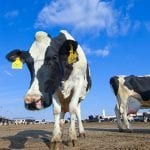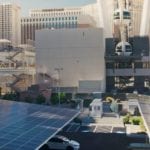Around The Web
NZ dairy giant Fonterra to phase out “insane” use of coal power to dry milk
 New Zealand's largest company Fonterra will to phase out use of coal power to dry milk, a practise that has been labelled 'insane'.
New Zealand's largest company Fonterra will to phase out use of coal power to dry milk, a practise that has been labelled 'insane'.
The post NZ dairy giant Fonterra to phase out “insane” use of coal power to dry milk appeared first on RenewEconomy.
The Silicon Valley space race
Air travellers may have to pay carbon charge to offset emissions
Planned tax will make public more aware of climate harm caused by flying, ministers hope
Air passengers may have to pay an extra “carbon charge” on flights as part of a government initiative to reduce CO2 emissions and tackle the climate crisis.
Passengers could choose to pay more for travel tickets, which would then be used to offset greenhouse gas emissions. Or the scheme could work on an “opt out” basis and also be applied to trains, buses and ferries.
Continue reading...Why 3D printing could be key to a Moon base
Company managing almost half of Vic's waste warns it will shut its doors
It's Sarabi's pride, Mufasa just lives there: a biologist on The Lion King
Silent, no gears and cheaper every day: electric cars aren't so hard to get used to
An EV test drive reveals they’re not so radically different – except for the sense of future-proofing
A few weeks ago in western Sydney, I fanged around the Eastern Creek racetrack looking to kick the wheels of the electric car revolution.
A lot has been written on the viability of the electric car: the price, the availability, the range, the chargers. But this was solely about the driving experience, from the perspective of someone who has only ever driven petrol cars.
Continue reading...Testing electric cars: is this the silent future of Australian motoring? – video
Naaman Zhou went to Sydney's Eastern Creek racetrack to try out the latest electric and hybrid vehicles that manufacturers hope will be adopted for government and private fleets – as well as the three-wheeler Toyota iRoad and a hydrogen-powered Hyundai model not yet on the market. He found some not that dissimilar to the feel of a conventional petrol vehicle, others radically different, but all disconcertingly quiet and a definite step up from his Toyota Corolla.
Continue reading...Science helps us to produce cheap and plentiful food | Letters
Caroline Lucas (Farming with nature helps wildlife, and humans too, Journal, 18 July) accuses agrochemical companies of “seeking to undermine the transition to environmentally friendly farming”. This statement could not be further from the truth. We are on the brink of the next agricultural revolution; advances in science and agricultural technology are helping to ensure a supply of plentiful and affordable food while reducing the impact on the environment. Our member companies play a critical role in supporting farmers on this journey by providing biological, seed-breeding, data, robotics and pest management solutions that go beyond chemicals.
To help fight climate change, we aim to be as productive as possible on the land we have. By using crop protection products, farmers are able to maximise the productivity of existing farmland, resulting in more land for nature. An organic and low-yield farming system would require more land to be brought into production for yield levels to be maintained, having significant impacts on nature. Indeed, researchers from Cambridge University recently found that high-yielding farming delivered better outcomes for biodiversity, compared with low-yielding systems.
Continue reading...Environment of greater concern than housing or terrorism – UK poll
Climate crisis concerns top British public’s policy priorities, poll findings reveal
Protecting the environment has overtaken affordable housing and the threat of terrorism in the British public’s policy priorities over the last eight months, polling has revealed.
Polling by BritainThinks, commissioned by Engage Britain, found that concern about the climate crisis has risen at roughly the same rate for all age groups, and has emerged as the single most important issue for young people. It comes as the activist group Extinction Rebellion is due to stage another round of protests expected to bring parts of the country to a standstill.
Continue reading...MG to begin sales of all-electric car in September
 MG says sales of all-electric ZS SUV/crossover will begin in September this year. So what will buyers get for their money?
MG says sales of all-electric ZS SUV/crossover will begin in September this year. So what will buyers get for their money?
The post MG to begin sales of all-electric car in September appeared first on RenewEconomy.
The Apocalypse Part 3: A supervolcanic winter
Weeding, writing and arithmetic… why green fingers are good for our children
From the water vole to the Scottish wildcat, the dwindling numbers of Britain’s most at-risk animals are well documented. But now the alarm bell is sounding over a rather more overlooked endangered species: green-fingered children.
Young people are so rarely spotted in gardens across Britain nowadays that the Royal Horticultural Society is warning that the country is facing a green skills crisis unless more learn to garden.
Continue reading...Teen kayaker clocks up 100 miles in Norfolk Broads clean-up
Would this burger tempt you to eat meat?
Next-gen solar modules launched by “father of PV” Martin Green
 World's leading solar PV researcher helps launch Sunport's innovative solar modules, as Australian solar tech starts to achieve market dominance.
World's leading solar PV researcher helps launch Sunport's innovative solar modules, as Australian solar tech starts to achieve market dominance.
The post Next-gen solar modules launched by “father of PV” Martin Green appeared first on RenewEconomy.
Women in science: Smashing glass ceilings and glass walls
Musk reveals EV charging station of the future – and his favourite Tesla models
 Tesla CEO on his favourite models, the latest super-fast charging station, why full autonomy is the future, and his plans for reusable rockets.
Tesla CEO on his favourite models, the latest super-fast charging station, why full autonomy is the future, and his plans for reusable rockets.
The post Musk reveals EV charging station of the future – and his favourite Tesla models appeared first on RenewEconomy.
The true cost of eating meat: if we want change, we have to pay for it
Australians can afford to spend more on food that meets higher animal welfare standards. It’s time to demand change from farmers
It’s easy to argue that the intensification of animal farming puts food on the average Aussie battler’s table at a price they can afford. By suggesting we eat less meat, or better-quality meat, it’s easy to be accused of favouring the rich: perhaps only they can afford the grass-fed, organic, free-range alternative?
So let’s take a look at the numbers. The average Australian spends about 14% of their income on food – down from about 19% of income 30 years ago. According to government statistics, total annual expenditure on meat and seafood was only $650 per person in 2015-16 compared with $734 in 1988-89, allowing for inflation (the data for seafood and meat were compiled into one number, unfortunately). We spend less on meat than we used to, and buy more of it. So now, according to the most recent numbers available, each week households spend an average of $13.70 on vegetables and $9.60 on fresh fruit. Compare that to the $40 or more we spend each week on takeaways, fast food and confectionery. Or the 31% of our food budget we spend eating out, a 50% increase on three decades prior. Or the $13 we spend, on average, per household, per week, on our pets.
Continue reading...


